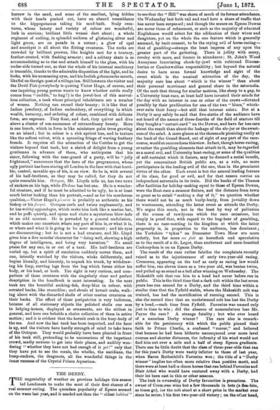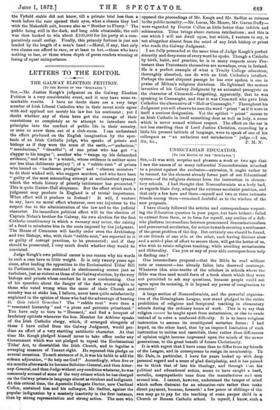THE DERBY.
THE ungeniality of weather on previous holidays this season led Londoners to make the most of their first chance Of a real summer outing. The quondam popularity of Epsom seemed on the wane last year, and it needed not then the "oldest habitud "
to see that the "Hill" was shorn of much of its former attendance. On Wednesday last both rail and road bore a share of traffic that has never been surpassed ; and though the scenes on Epsom Downs daughters, yet on the whole the one feature which is generally assumed, by tacit consent, to be the crying evil of horse-racing- that of gambling—stamps the least impress of any upon the greater part of the gathering. There is jollity with many, revelry with more, and licence in abundance ; St. John's Wood Anonymas luxuriating cheek-by-jowl with rubicund Blooms-
burian or Camberwellian respectability ; but beyond the natural desire to have some formal knowledge and sight of the event which is the nominal attraction of the day, the majority care less about "which is the winner" than about their personal merriment and general share in the saturnalia. Of the mob that throng for similar motives, like sheep to a gap, to a University boat-race, at least half have invested their minds for the day with an interest in one or other of the crews—dictated possibly by their predilection for one of the two "blues," which- ever suits their lancy—but still that interest exists. But at a Derby it may safely be said that five-sixths of the audience have not heard of the names of three-fourths of the field of starters till they bought a " correct-card" on the Downs, and have far less care about the result than about the leakage of the ale-jar or the sweet- ness of the salad. A mere glance at the thousands picnicing coolly at the back of the Grand Stand, out of sight of any part of the race- course, would at once endorse this view. In fact, though horse-racing, or rather the gambling elements that attach to it, may be regarded as a moral evil, and University boat-racing, or some of the qualities of self-restraint which it fosters, may be deemed a social benefit, yet the concomitant British public are, as a rule, no more participators in the leading evil of the one, than in the prominent virtue of the other. Each event is but the annual leading feature of its class, for good or evil, and for that reason carries an independent saturnalia in its train. Did the banks of the Thames offer facilities for holiday-making equal to those of Epsom Downs, were the Boat-race a summer fixture, and the distance from town so great as to entail "making a day of it," we question whether there would not be as much hurly-burly, from joviality down to wantonness, attending the latter event as attends the Derby. We argue this much, not in the least by way of palliation of the scenes of rowdyness which the race occasions, but simply in proof that, with regard to the bug-bear of gambling, there is no race-meeting in the kingdom at which the latter propensity is, in proportion to the audience, less dominant ; the Yorkshire "tykes" on Doncaster Town Moor are more orderly, but far more we fait at horseflesh and speculative as to the result of a St. Leger, than exuberant and soon-besotted Cockneydom is on an Epsom Derby.
The result of the race rather falsifies the complaints recently raised as to the injuriousness of early two-year-old racing. Cremorne, appearing on the turf as early as racing law would suffer him, ran eleven times as a two-year old, was beaten twice, and pulled up as sound as a bell after winning on Wednesday. The Makeshift colt that ran him to a head bad never before ran in public. This is the third time that a dark colt within the last seven years has run second for a Derby, and the third time within a similar time that the Fyfield stable, where the Makeshift colt was trained, has had the mortification of running second. This is also the second time that an unchristened colt has lost the Derby by a head,—each time from Fyfield. Favonius was named only just in time to win ; did the absence of nomenclature lose Mr. Payne the race ? A strange fatality ; but who ever heard
of a nameless Derby winner? The race also is remark- able for the persistency with which the public pinned their faith to Prince Charlie, a confessed "roarer," and believed that because he had been hitherto unconquered over more level courses and shorter distances, the infirmity of his wind would not find him out over a mile and a half of steep Epsom gradients. There can be little doubt that the clan of three-year-olds that ran for this year's Derby were vastly inferior to those of last. year, when Baron Rothschild's Favonius won ; the title of a "Derby winner" implies too often more relative than positive merit, and there were at least half-a-dozen horses that ran behind Favonius and Blair Athol who would have cantered away with a Derby, had their lot been cast in this or, other seasons.
The luck in ownership of Derby favourites is precarious. The owner of Crem-Jrne wins but a few thousands in beta (a flea-bite, as times go), for the colt stood at a short price in the market ever since he secura his first two-year-old victory ; on the other head,
the Fyfield stable did not know, till a private trial less than a week before the race opened their eyes, what a chance they had with the Makeshift colt, known also as "Brother to Flurry." The public being still in the dark, and long odds obtainable, the colt was then backed to win about 1100,000 for his party at a com- paratively small outlay. Finally, this princely fortune is just not landed by the length of a man's hand : —Moral, if any, that only two classes can afford to race, or at least to bet,—those who have nothing to lose, or those whose depth of purse renders winning or dosing of equal unimportance.



































 Previous page
Previous page